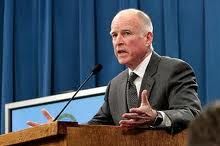Gov. Brown’s May budget revision still kicks the can
By John Seiler
Gov. Jerry Brown’s May Revision to his January budget certainly was a happier occasion than for any budget in a decade. Thanks to money pouring in from the tax increases, especially $7 billion from Proposition 30, he’s projecting balanced budgets well into the future.
But it’s a good question whether the happy news will last. At his press conference, the governor repeatedly warned that the economy is not too strong; and that problems could cause future budget difficulties. Yet he’s budgeting a “rainy day fund” surplus of just $850 million for fiscal year 2012-13, which ends on June 30; and only double that, $1.7 billion for fiscal year 2013-14, which begins July 1.
Yet as we saw with the dot-com bust of 2000, and the breaking of the real-estate bubble in 2007, revenues quickly can drop $15 billion in one year. With economic recessions or depressions hitting about every four to six years, the last striking in 2007, we’re overdue for a new slump.
In his press conference in Sacramento announcing his budget, and in a conference call shortly after in which I participated, he celebrated that he was able to pass Prop. 30; and that it’s now bringing in the expected revenues. With the economy now growing and the sun still shining on California’s golden coast, he might get his way for a while.
Wealthy exodus?
But a new study shows that he might not get his way. The study is by W. Erik Bruvold and John Nienstedt for the National University System Institute for Policy Research. It found:
* “When surveyed in March 2013, a substantial percentage of residents in California’s most affluent communities were seriously considering (12%) or somewhat considering (13%) moving out of state as a response to recent increases in the state’s income tax rates.
* “To reduce the incremental burden of the new income tax increases, 75% of individuals surveyed were planning on taking at least one of the following actions: — increasing their level of philanthropic contributions, increasing their tax deductions, using more tax-free financial instruments such as municipal government bonds, and reducing their overall earnings.
* “[T]he strongest predictive variable for considering moving out of state is whether the respondent knows someone who made a similar move. This finding suggests that California could experience a snowball effect if the negative attitudes associated with the tax increase directly translates into even a relatively small number of out migrations.”
During last fall’s campaign for Prop. 30, Brown cited a study by two Stanford sociologists, not economists, showing that rich people would not leave because of the tax increase. I criticized the study at the time here, here and here.
We’ll soon find out who is right. But a downturn could lead wealthy people to find ways to avoid that hefty 13.3 percent top state income tax rate, finding refuge — taking their investments and business with them — in Nevada, Texas and Washington State, all of which have zero percent state income taxes.
Unfunded liabilities
In the conference call, a reporter asked about the $4.5 billion a year the California Teachers’ Retirement System insists is needed to keep its fund solvent. “This is a problem. I recognize it,” the governor replied. “But we’re not going to get to it this year.”
That means the yearly amount needed to fix the system will grow ever higher. It’s like not paying your credit card bill for a year. The amount doesn’t stay the same, but goes up because of interest and possible penalties.
And on Page 6 of the budget document, we read:
“California still needs to address other liabilities that have been created over many decades. For example, beginning in 2015-16, the state will begin to pay hundreds of millions of dollars more to the California Public Employees’ Retirement System to help pay down the $38.5 billion unfunded liability for state employees’ pensions.”
But as Dan Walters wrote Tuesday, when pension and other unfunded liabilities are tallied, the real number is $1 trillion. This is a fiscal time bomb that the governor just is not addressing — not even the $4.5 billion a year part of it from CalSTRS.
So again, despite the rhetoric, the governor just is kicking the can down the road — just not quite as far as under Gov. Arnold Schwarzenegger and Gov. Gray Davis.
Even a small blip into recession will collapse his budget projections.
Related Articles
Plan Would End Collective Bargaining
FEB. 10, 2011 By LANNY EBENSTEIN There are at present several approaches being considered to reform public unions in California,
PPIC Poll's Loaded Pro-Tax Questions
DEC. 10, 2010 By WAYNE LUSVARDI The first rule of opinion polling is that if you are allowed to frame
Chamber launches ‘California Comeback’
Aug. 31, 2012 By Joseph Perkins Here’s an ad: “California is struggling … badly. Two million people out of work… Huge



